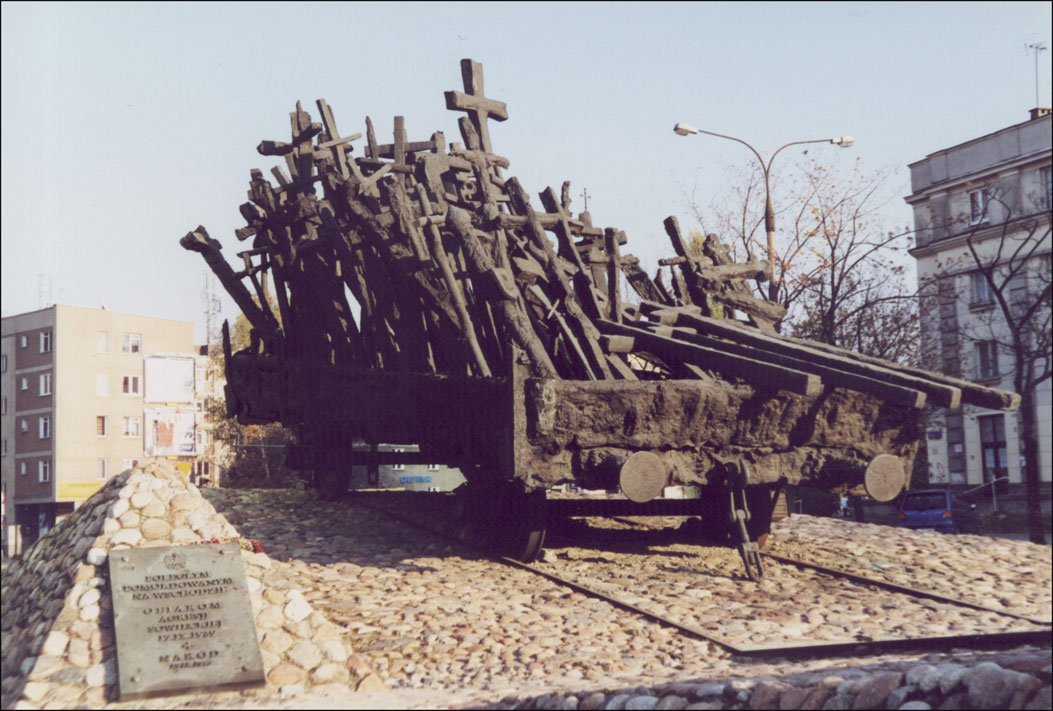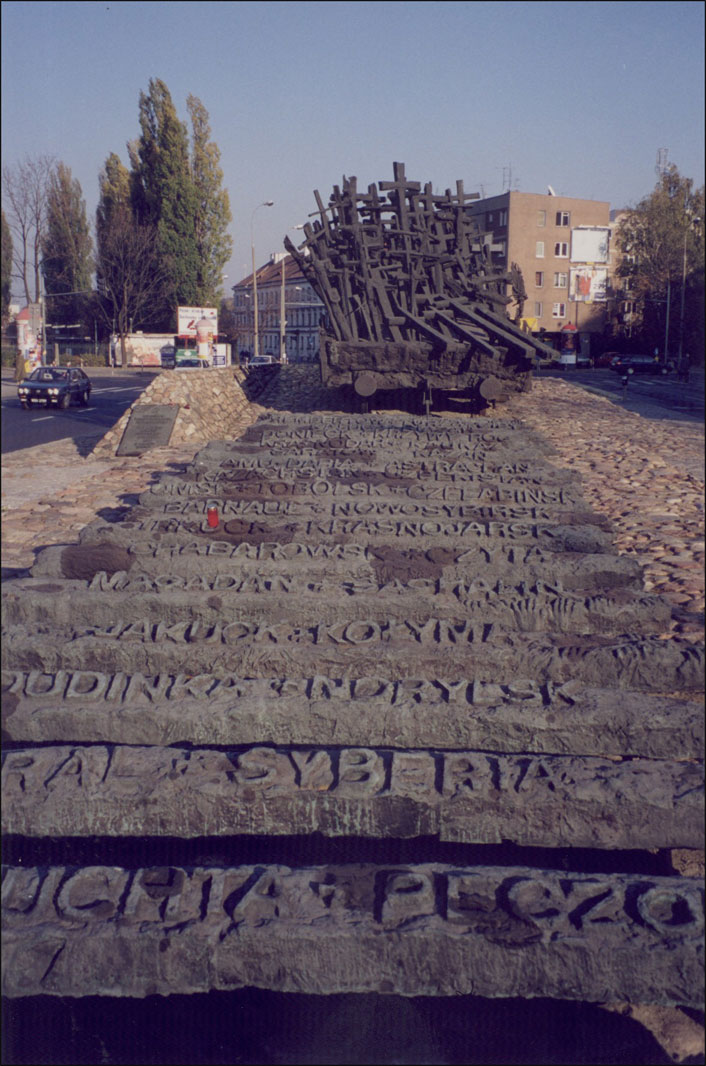The documentary film, A Forgotten Odyssey, describes the invasion of Poland by the Soviet Union on September 17, 1939 and the consequences of that invasion.
The truth is, the odyssey of the Polish people after the Soviet occupation was not forgotten . It was hushed up by the West.
Warsaw Memorial to the Villages Overrun by the SovietsÂ
As the Soviets rounded up the officers of the Polish military to be later executed in the Katyn Forest Massacre, 1.7 million Polish citizens including the families of the officers, shopkeepers, and even entire villages that resisted Soviet authority were herded onto cattle trains and sent to Siberia, Kazakhstan, and remote regions of Russia.
The people were packed into train cars with a nothing but a cast iron stove in the middle of the car . Food and water were infrequently offered, and no lavatory facilities were available . To relieve their bladders and their bowels, they were provided only with a small hole in the floor of the train car.
One survivor recalled that her grandmother became ill on the trip . No medical attention was provided and her grandmother died . Their captors tossed the body of her grandmother into a ditch and the train moved on.
When the captives reached their various destinations, they were put to work at hard labor, still without adequate food, water, or medical care . In at least some cases, the captives had to kill wild animals on the steppes .  But in a hostile environment wild game was scarce; some of the captives were reduced to catching steppe rats for food . One man recalled that he was assigned to work in the bitter cold at night, and that to stay warm he would splash water on his clothes . The water would freeze almost immediately into a hard shell, and the icy shell helped keep him warm.
After the Germans betrayed the Soviets and invaded the Soviet Union on June 22, 1941, Britain convinced the Soviets to offer amnesty to the Poles and allow them to form a Polish Army to fight Hitler . The Soviets allowed a number of the Poles to travel to Iran where the Allied forces were moving war supplies to the Eastern Front . The difficult journey to Iran through inhospitable territory may have been the greatest trial the refugees had yet faced . By the time the Poles reached Iran, they were starving, but they were generously received and fed by the American and British soldiers there . They were not, however, allowed to speak of their treatment at the hands of the Soviets, lest they offend the Soviet Union, the new ally of America and Britain.
On the Railroad Ties are the Names of the Villages Overrun by the SovietsÂ
Many of the Polish refugees who reached Iran entered the military service to fight alongside the Allies, not realizing that the Allies had already agreed to turn the eastern half of Poland over to the Soviet Union . At the conclusion of the war, these soldiers found they had won the war, but had lost their home .  Over 110,000 of them and their families emigrated to England, and the rest relocated to other parts of the world .
Of the 1.7 million Poles sent to the work camps in the Soviet Union, only about 500,000 are known to have survived . Many of the survivors tried to forget these horrible years and later in life refused to talk about the experience at all . In all, over 6 million Poles died during World War II at the hands of the Germans or the Soviets.






Hi. I am currently trying to translate the remainder of my father’s diaries, which he wrote from the time his family was exiled from Sniatyn. They cover the whole journey to Kazakhstan and the period of incarceration there for his family and eventually his release to travel to Iraq to join the Allies. He translated about half before he died, but I’m not sure where to turn to get the rest done. As you say, many survivors do not wish to speak of their experiences at the hands of Soviet Russia, but this diary may stand as a testimony to that which so many forgotten Poles suffered.
Your advice would be gratefully received.
Many thanks,
Paul
Thanks for your message. I assume the diaries are in Polish and you are located in Great Britain.
There are a large number of individuals and companies that will translate documents for you. If your father’s diaries are lengthy, the cost for professional translation can be quite expensive. I found one company in London that you could contact: http://www.polishtranslators.co.uk/, but there are many others, including one in Poland and the USA at http://www.polish-translators.com/index.html.
If you are willing to have the diaries translated by someone who is not a professional translator, the costs will be less, but the translations will take longer to complete and are likely to contain more errors. Check out the Sikorski Polish Club webpage at http://www.sikorskipolishclub.org.uk/links.htm. You might be able to contact one of the organizations listed there and see if someone would like to translate the diaries. You may be able to find someone who is willing to translate the diaries at a lower cost than a professional translator would charge.
Thank you for providing information. My father was the only survivor from a family of 4 at Siberia. He would never talk about his memories. I found out little snippets from other Polsih men who knew of his ordeal. Now he has passed away I am begining my research to try to visit where he was born(now under the Soviets). It is important to English only speaking descendants that information like yours becomes available. Thank you for your work.
For: Paul Bielecki
I am a member of the Sniatyn landsmanshaft (towngroup) in the US. We would very much like to get in touch with you and share information.
Please see our website about the town that your family came from at :http://www.shtetlinks.jewishgen.org/sniatyn/. You can get in touch with me at the email address at the bottom of that page.
Thank you.
It is time the Nation learned the full truth. Poland is now free to “Speak Out”. Roman Catholic victims have yet to be added to the “Holocaust” also excluded are “Katyn”. History shall be altered and the full story told. Great web site. Lets all stand together.
Hi
My family also comes with Åšniatyn, Åšniatyn cemetery the grave of my great-grandfather jes Andrzej Bielecki, if they are important for you to write information to email address
greet Peter Bielecki
My grandfather Jan f Sikora and RIP father Zbigniew Sikora survied the forgatten odessy , served in the Polish Army under General Anders .. Would to know more about the history , one travel retrace the family experience .
Thank you for the information. My mother is also one of the survivors. I also agree this story should be told so no one would forget what these poles endured during these years. I am researching the information available and would like to put together a book mainly focusing on how the culture, language and faith of these people without a home certainly survived.